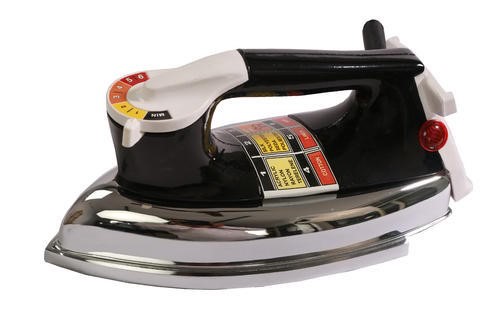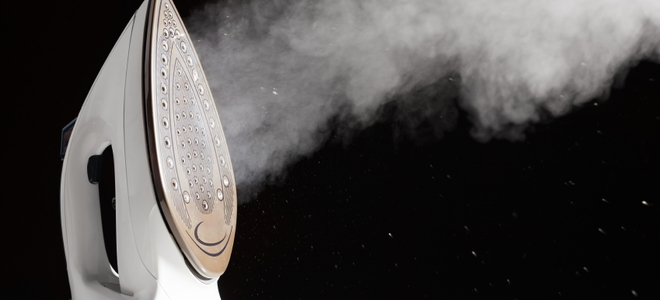

 | |||||||
| WHAT IS FLAT IRON??? Electric Flat iron is an important domestic appliance. We use iron to press clothes. Ironing removes wrinkles in fabric and it requires heat. When the fabric is heated, it becomes soft and mobile and then by applying pressure it can be given preferred orientation which is retained when the fabric is cool. Electric flat irons operate with 220 volt AC and are available with usual power rating between 450 watt and 2.0 kilowatt. The common working temperature is around 100*C and safety devices are provided in some models to prevent temperature rise beyond 200*C or 250*C. Small irons of power rating as low as 300 watts are also available. Now a days numerous models from various manufacturers are available. Modern electric irons have attractive features like beautiful look, light weight; multiple adjustable temperature levels to suit different fabrics, non stick coated sole plate, thermal fuse for safety etc.
History and Development Of FLAT IRON:
Metal pans filled with hot coals were used for smoothing fabrics in China in the 1st century BC. From the 17th century, sadirons or sad irons (from an old word meaning solid) began to be used. They were thick slabs of cast iron, delta-shaped and with a handle, heated in a fire. These were also called flat irons. A later design consisted of an iron box which could be filled with hot coals, which had to be periodically aerated by attaching a bellows. In Kerala in India, burning coconut shells were used instead of charcoal, as they have a similar heating capacity. This method is still in use as a backup device, since power outages are frequent. Other box irons had heated metal inserts instead of hot coals.
https://en.wikipedia.org/wiki/Clothes_iron
TROUBLESHOOTING PROCESS OF AN ELECTRIC FLAT IRON
Electric Iron Repair http://www.doityourself.com/stry/how-to-repair-your-iron
Yes, people do still iron. This Fix-It Guide on electric iron repair tells how an electric iron works, what often goes wrong, how to identify an electric iron problem, and what parts and tools you will need to fix it. It then gives simple step-by-step instructions for how to clean an iron, how to service an iron steam and spray mechanism, and how to clean a metal soleplate. This Fix-It Guide also refers to electrical cord repair and appliance control repair for more information on specific repairs.
How Does an Electric Iron Work?
Whether it’s a basic no-frills iron, a cordless model, a compact travel iron, or an electronic iron loaded with features, all steam irons work in the same way. They press out wrinkles in fabric using moisture, pressure, and heat. When the steam valve is closed, the iron operates dry. When the steam valve is open, water drips into a heated steam chamber, where it exits as steam through vents in the soleplate. The iron’s working surface, the soleplate, may be plain metal or coated with an easy-to-clean nonstick material.
What Can Go Wrong with an Electric Iron?
Fortunately, there is very little inside a well-made iron that can go wrong. Most repairs are for faulty cords, damaged handles, and mineral deposits that hamper steam irons. Problems with an iron’s electronic complements should be dealt with by an authorized service center. It typically is more cost effective to replace rather than repair an iron with internal problems. Check the owner’s manual for your iron to learn the manufacturer’s suggestions for cleaning, what water to use, and storage tips.
How Can I Identify an Electric Iron Problem?
As with many small appliances, regular maintenance makes a dramatic difference in how trouble free your electric iron will be. Even so, things can happen.
What Do I Need for Electric Iron Repair?
Larger hardware stores may have replacement parts for popular brand electric irons. Also, you can get them from the manufacturer or an aftermarket supplier. Maintenance and repair tools you’ll need to fix an electric iron include these:
What Are the Steps to Electric Iron Repair?Clean an electric iron:
Service an electric iron steam and spray mechanism:
Clean an electric iron metal soleplate:
OTHER TROUBLESHOOTING GUIDE FOR FLAT IRON:
How to Repair Common Iron Problems
An iron is a small appliance used to straighten out wrinkled clothes and kill any microbial activity occurring inside the clothing. Very little repairs are usually needed for a well-made iron, but sometimes you will need to fix broken handles, faulty cords, and clogged holes where steam is released. You can easily repair problems by following the steps described below.
Step 1 - Identify the Problem
It's important to know what sort of problem exists and what is required to repair it before starting. Read the manual provided with your iron first to be sure there is nothing wrong with your settings. Next, check the thermostat and electric cord if the iron does not heat or heats up exceedingly high when the power is switched on. If steam is not coming out properly or the water is being spat out when the iron is on, check the bottom of the iron (sole plate) and holes from where steam is released for debris or obstructions. Last but not least, check the sole plate surface if the clothes are clinging to it to see if there is any residue or debris burned onto it.
Step 2 - Take Appropriate Precautions
Switch off or disconnect the iron and leave it to cool off completely. If you start repairing the iron while it is still plugged to the circuit, you might get an electric shock.
Step 3 - Replace the Power Cord and Thermostat
Before you get into replacing the power cord, make sure you can find a new one for your particular appliance. Try local appliance repair shops, online sellers, or take it into a hardware or appliance store to see if there is perhaps a universal cord that will work.
Remove the cover panel first using an appropriate screwdriver. There will often be another set of screws just inside, securing the cord in place, and you'll need to remove these as well. Then, remove the wire nuts connecting the power cord to the wiring inside the iron and set it aside. Connect the new one in the exact same way as the old and screw it back into place. This is also the best time to replace the thermostat if it too is having problems.
Finally, screw the cover panel back into place, and switch the iron back on to check that it is heating properly.
Step 4 - Clean the Sole Plate
Anything that is stuck to the sole plate can cause problems with the function of your iron, so it's important that this piece is cleaned whenever it's stained or dirty. For stains, dampen a cloth, put salt on it, and rub the bottom of the iron, or simply use a nylon pad with water and soap. If the blemish is stubborn, some toothpaste can be rubbed on with a soft cloth. When the sole plate gets buildup on it from ironing starched clothing, use white vinegar to remove it. You can also mix an equal amount of vinegar and salt and use it on the sole plate after heating the solution. Do not employ wire gauze pads, abrasive pads, or even abrasive cleaners, as these may scratch the non-stick coating on the iron and damage it permanently.
Step 5 - Remove Burn Marks
Cover the whole iron with paper except the bottom. Then, take the iron out into an open air space so the oven cleaner fumes do not spread inside the house. Directly sprinkle oven cleaner on the sole plate. Leave it for three minutes before you wash and rinse with cold water. Remove the paper when you're finished.
Step 6 - Clean the Water Container and Steam Holes
Fill the reservoir about a quarter full with white vinegar, and then empty it by steaming the iron. The vinegar fumes will open the holes that were earlier clogged by mineral deposits. Continue repeating this process until the holes are totally devoid of deposits.
To clean the container itself, fill it with distilled water and wash it thoroughly, making sure no vinegar remains in the reservoir or the holes.
|









Pragmatic Hongsenese always adhering to the business philosophy- “create value for the customers, create development for the staff; create wealth for the society, Private Label Hair Straighteners- Hongsen
TumugonBurahinWilliam Hill Sports Betting Review » Claim Your €500 Bet Bonus
TumugonBurahinIf you want to learn more about the William Hill sportsbook bonus, check out sbobet ทางเข้า this review which covers the various sports bet william hill markets in Canada 샌즈카지노 and